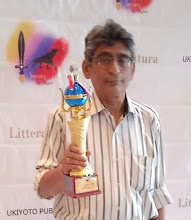As we mentioned Hanuman Chalisa is a collection of forty chaupais (four-line-stanza verses) or devotional hymns or stotra in praise of Lord Hanuman. The verses describe the half-monkey God Hanuman as a staunch Bhakta of Lord Ram, a man of strength, courage and wisdom and a man without desire. As most citizens of the world know that Hanuman is one of the central characters of Ramayana, he is always in the service of Rama and doing everything possible for him to eradicate evil without expecting rewards. He is also regarded in India as a deity of Sankat Mochan, that is recuing humans from all crises and obstacles. Reciting Hanuman Chalisa is believed to help humans to overcome all such obstacles, realize one’s wishes and progressing in the path to liberation from all adversities or afflictions, finally achieving Moksha.
The Hanuman Chalisa booklet, apart from being readable to all knowing the Devanagari script are available in various Indian languages plus the numerous music albums. One CD sung by the reputed Indian singer Hariharan has reportedly achieved more than 2 billion views. Millions of Indians recite the Chalisa daily, anytime or any number of times they desire, at homes and even while on the move. The easily recognizable booklet in Awadhi is there in our home too. My wife reads it whenever she feels the need, almost daily at least once. And she sits in seclusion to read it, and reads it silently so that it does not disturb me or others present, irrespective of we being believers or non-believers. At times she reads it silently, sitting in the car as I drive on peacefully.
Prayers, thus, were central to the Prophet’s preaching and teachings in order to attract more and more followers. Azaan started as a response; it is not clear if he himself started this or appointed his main follower to start making the calls. Anyway, to catch the attention of the followers and inspire them to come to the prayers Prophet Muhammad needed public announcements. The loudspeakers came only in the first part of the 20th century. Of course, other mechanical devices like the bells, the drums and the horns were available; but Muhammad preferred only to use his own strong voice or the voice of the muezzin for that purpose.
However, when the loudspeakers were invented in the 1930s the Muslim countries started using those and fitted the devices in the minarets and the mosques, mostly as a show of strength of their faith rather than devotion. It is believed that Azaan or prayers need to be done five times a day for devout Muslim, and thus in many countries including the Muslim-majority ones the loudspeakers slowly started becoming a nuisance in terms of noise pollution. Over the decades we’ve seen restrictions imposed on the use of loudspeakers and the imposition of decibel limits becoming a common practice in may countries including Saudi Arabia.
In India the loudspeakers for Azaan began to be used only from the 1970s and as the country’s Constitution had declared India as a socialist secular democratic republic all religious practices, festivals and rituals have been allowed in all their ritualistic grandeur. But in the past decade we’ve seen selective protests fueled obviously by the growth of aggressive majority nationalism and fundamentalism of various forms. The present controversy raging, unfortunately, throughout the country is nothing but practices of religion-based politics and growing intolerance—one making the other more and more intolerant in a vicious circle.
We had earlier argued that chanting Hanuman Chalisa silently or loudly is a personal choice with nothing to do with public announcements. We can express similar feelings about Azaan too. In modern digital times, it’s just not possible for the educated and working Muslims to offer prayers five times a day, that too at a public place of worship. In whole of my service career, I’ve seen my Muslim colleagues and friends offering Namaz only on the Friday afternoons, at the mosque nearby or in office itself, silently. I’ve also seen numerous passengers in train journeys doing Namaz quietly, putting a piece of cloth on the floor in-between the berths, without disturbing anyone. Therefore, I’d say Azaan or Namaz or any kind of Islamic prayers are getting increasingly influenced by personal choices. To call it anti-Islamic would be another form of fundamentalist intolerance.
You are right when you object to the noise of the loudspeakers, particularly keeping in mind the differently abled and the patients in general. But you cannot be selective about your protests or you cannot try to right a wrong with another wrong. If you ask, righteously so, for a ban on the loudspeakers in public places to prevent noise pollution which is indeed a growing menace it has to be a blanket ban, covering all kinds of religious-cultural events/festivals/rituals taking place twelve month a year in our country. And, you hardly hear religious chanting of hymns or stotra on the mikes, you only hear film songs and even disco songs so that the devoteescan dance too.
This kind of hypocrisy and the growing politicization cum commercialization of religions must stop. High time to adopt a new modern religion of making the religion a matter of personal choice; preferably in the innermost corners of your excellent and powerful mind or within the four-walls of your homes or within the four-walls of any place of worship. The Pandemic nearly accomplished this; but unfortunately, humankind hates to learn from even disasters.



.jpeg)
Comments
Post a Comment
Hi! Welcome! Please comment what you feel! 😊